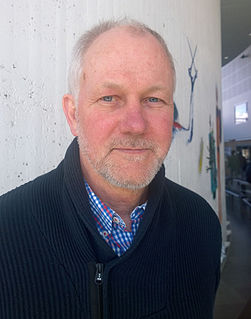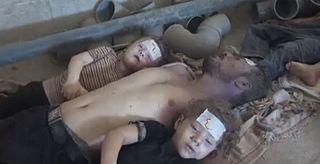Related Research Articles

The BM-14, is a Soviet-made 140mm multiple launch rocket system (MLRS), normally mounted on a truck.

Ghouta is a countryside and suburban area in southwestern Syria that surrounds the city of Damascus along its eastern and southern rim.

Muadamiyat al-Sham is a town in southern Syria, administratively a part of the Darayya District in the Rif Dimashq Governorate, located ca. 10 kilometers (6.2 mi) southwest of Damascus, within an area called the Western Ghouta. Nearby localities include the centre of Darayya to the east, Jdeidat Artouz and Sahnaya to the south, and Qudsaya to the north.

Ashrafiyat Sahnaya is a city in southern Syria, administratively part of the Rif Dimashq Governorate, located southwest of Damascus. Nearby localities include Darayya to the north, Sahnaya to the south, and al-Sabinah to the east. According to the Syria Central Bureau of Statistics, the city had a population of 30,519 in the 2004 census. Ashrafiyat Sahnaya is one of the few towns in the Ghouta with a majority Druze community, along with Jaramana, Sahnaya and Deir Ali.

Åke Sellström is a Swedish academic and expert in arms, especially in chemical weapons. He has been active at the Swedish Defence Research Agency (FOI).
There have been very many reports of chemical weapons attacks in the Syrian Civil War, beginning in 2012, and corroborated by national governments, the United Nations (UN), the Organisation for the Prohibition of Chemical Weapons (OPCW), Human Rights Watch (HRW), and media organizations. The attacks occurred in different areas of Syria, including Khan al-Assal, Jobar, Saraqib, Ashrafiyat Sahnaya, Kafr Zita, Talmenes, Sarmin and Douma. The deadliest attacks were the August 2013 sarin attack in Ghouta and the April 2017 sarin attack in Khan Shaykhun. The most common agent used is chlorine, with sarin and sulphur mustard also reported. Almost half of the attacks between 2014 and 2018 were delivered via aircraft and less than a quarter were delivered from the ground, with the remaining attacks having an undetermined method of delivery. According to a February 2019 study by researchers at the Berlin-based Global Public Policy Institute, chlorine was used in 91.5% of chemical attacks since 2012.

The Ghouta chemical attack occurred in Ghouta, Syria, during the Syrian civil war, in the early hours of 21 August 2013. Two opposition-controlled areas in the suburbs around Damascus were struck by rockets containing the chemical agent sarin. Estimates of the death toll range from at least 281 people to 1,729. The attack was the deadliest use of chemical weapons since the Iran–Iraq War.
The Independent International Commission of Inquiry on the Syrian Arab Republic was set up by the United Nations Human Rights Council (UNHRC) on 22 August 2011 to investigate human rights violations during the Syrian Civil War to establish the facts and circumstances that may amount to violations and crimes and, where possible, to identify those responsible to be held accountable with a future prosecution of Syrian civil war criminals. The Commission posts regular updates via its official Twitter page.
The Khan al-Assal chemical attack was a chemical attack in Khan al-Assal, Aleppo, Syria on 19 March 2013, which according to the Syrian Observatory for Human Rights resulted in at least 26 fatalities including 16 government soldiers and 10 civilians, and more than 86 injuries. Immediately after the incident, the Syrian government and opposition accused each other of carrying out the attack, but neither side presented clear documentation. The Syrian government asked the United Nations to investigate the incident, but disputes over the scope of that investigation led to lengthy delays. In the interim, the Syrian government invited Russia to send specialists to investigate the incident. Samples taken at the site led them to conclude that the attack involved the use of sarin, which matched the assessment made by the United States. Russia held the opposition responsible for the attack, while the US held the government responsible. UN investigators finally arrived on the ground in Syria in August, but their arrival coincided with the much larger-scale 2013 Ghouta attacks which took place on 21 August, pushing the Khan al-Assal investigation "onto the backburner" according to a UN spokesman. The UN report, which was completed on 12 December, found "likely use of chemical weapons in Khan al-Assal" and assessed that organophosphate poisoning was the cause of the "mass intoxication".
The Jobar chemical attacks allegedly occurred in Jobar, Damascus, Syria, in April 2013. A reporter and a photographer for the French newspaper Le Monde spent two months in Jobar reporting on the attacks. However, the U.N. mission which investigated the attack could not find "sufficient or credible information" to support the allegation.
Part of the Syrian Civil War, the Rif Dimashq Governorate campaign consisted of several battles and offensives across the governorate including the Syrian capital of Damascus:

The Rif Dimashq offensive was a Syrian government forces and allies offensive in the Rif Dimashq Governorate that was launched in late March 2013, as part of the Syrian Civil War.
The Report on the Alleged Use of Chemical Weapons in the Ghouta Area of Damascus on 21 August 2013 was a 2013 report produced by a team appointed by United Nations Secretary-General (UNSG) Ban Ki-moon to investigate alleged chemical weapon attacks during the Syrian civil war. The report published on 16 September 2013 focused on the 21 August 2013 Ghouta chemical attack, which took place whilst the Mission was in Damascus to investigate prior alleged incidents, including the Khan al-Assal chemical attack in March 2013.

Kfar Daʽel is a district of Aleppo city in northern Syria, located northwest of the neighbouring Al-Rashidin District of Aleppo, which is a part of the Mount Simeon District in the Aleppo Governorate.
The OPCW Fact-Finding Mission in Syria is a mission of the Organisation for the Prohibition of Chemical Weapons (OPCW) to investigate some possible cases of the use of toxic chemicals in Syria during the civil war, including chlorine. The 21 August 2013 Ghouta chemical attack used sarin. The OPCW-Director General Ahmet Üzümcü announced the creation of the mission on 29 April 2014. This initial mission was headed by Malik Ellahi. The Syrian Government agreed to the Mission.

The Khan Shaykhun chemical attack took place on 4 April 2017 on the town of Khan Shaykhun in the Idlib Governorate of Syria. The town was reported to have been struck by an airstrike by government forces followed by massive civilian chemical poisoning. The release of a toxic gas, which included sarin, or a similar substance, killed at least 89 people and injured more than 541, according to the opposition Idlib Health Directorate. The attack was the deadliest use of chemical weapons in the Syrian civil war since the Ghouta chemical attack in 2013.

The Ashrafiyat Sahnaya chemical attack took place in Ashrafiyat Sahnaya, Syria, on 25 August 2013. A group of Syrian Army soldiers were struck by an object containing sarin.

The Jobar sarin attack took place on 24 August 2013 around 11:00 in Jobar, a suburb of the Syrian capital city Damascus.
The 2017 Jobar offensive was a military operation launched by the Syrian Arab Army and allies against rebel positions in the eastern outskirts of Damascus city, mainly the neighbourhood of Jobar and Ayn Tarma.

The siege of Eastern Ghouta was a siege that was laid by Syrian Government forces in April 2013, to the area in eastern Ghouta held by anti-government forces since November 2012, during the Syrian civil war. The cities and villages under siege were Douma, Mesraba, Arbin, Hamouria, Saqba, Modira, Eftreis, Jisrin, as well as suburbs of Damascus Beit Sawa, Harasta, Zamalka, Ein Tarma, Hazeh and Kafr Batna. By 2016, around 400,000 people were trapped in an area just over 100 square kilometres in size, thus with a population density around 4,000 inhabitants/km2.
References
- 1 2 3 "United Nations Mission on Investigate Allegations of the Use of Chemical Weapons in the Syrian Arab Republic". United Nations. 13 December 2013. Retrieved 6 February 2014.
- ↑ "UN chief announces independent probe into allegations of chemical attack in Syria". New York: UN. 21 March 2013. Retrieved 8 April 2014.
- ↑ "Secretary-General's Press Encounter on Syrian Government Request". New York: UN. 21 March 2013. Retrieved 6 May 2014.
- ↑ "Head of UN probe into chemical weapons use in Syria says preparatory work has begun". New York: UN News Centre. 27 March 2013. Retrieved 1 May 2014.
- ↑ "Report on the Alleged Use of Chemical Weapons in the Ghouta Area of Damascus on 21 August 2013" (PDF). United Nations. 16 September 2013. Retrieved 19 September 2013.
- ↑ "UN Mission to Investigate Allegations of the Use of Chemical Weapons in the Syrian Arab Republic - Press Conference" (Press release). U.N. 13 September 2013.
- ↑ "Press Conference on Mission to Investigate Alleged Chemical Weapons Use in Syria" (Press release). U.N. 13 September 2013.
- ↑ "Ban Ki-moon on Dr. Åke Sellström's final report on alleged chemical weapons' incidents in Syria" (Press release). U.N. 12 December 2013.